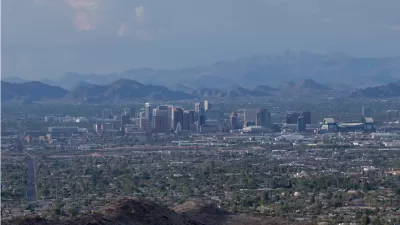Emma Marris reviews a new book by Andrew Ross, a cultural critic at New York University, that tries to understand how Phoenix came to be what it is, and determine whether there's any way it can be turned around.
Rather than focusing on the sustainability success stories being advanced by the converted in cities like Portland and San Francisco, Ross suggests that more important lessons about large scale climate change intervention can be gained from observing efforts to introduce green initiatives in cities like Phoenix, which are, "the weakest links in a chain that has to be strengthened tenfold" if the planet is to remain livable in the face of climate change." And this is the focus of Ross's new book, Bird on Fire: Lessons from the World's Least Sustainable City
As Marris notes, the challenges faced by Phoenix are daunting, "it uses a huge amount of water for a desert community -- more than twice the per capita rate of Seattle, which gets nearly 39 inches of rainfall a year -- and pumps most of it more than 300 miles uphill from the overtaxed Colorado River. Its air is brown with smog; its shadeless concrete landscape absorbs heat. And its black and Latino neighborhoods are cesspools of toxic waste."
And sustainable solutions to those challenges will be hard to come by within the city's traditional model for economic development based on continued outward physical growth. Sadly, in interviews with the real estate powers that be, Ross finds that they are, "more excited about designing green on a blank slate than doing the complex and less glamorous work of increasing density in the central city," which is perhaps the only way for the city to grow sustainably.
In the end, however, Ross seems skeptical of the prospects for achieving sustainability with any type of growth. According to Marris, "[h]e does not believe in the notion of sustainable growth. True sustainability, he argues, consists of rejecting growth and -- crucially -- achieving social equality. Over and over he returns to the notion that you can't buy your way out of an environmental hole with cool gadgets marketed to middle-class people."
Thanks to Scott Dodd
FULL STORY: Bird on Fire: Lessons from the World's Least Sustainable City (Book Review)

Maui's Vacation Rental Debate Turns Ugly
Verbal attacks, misinformation campaigns and fistfights plague a high-stakes debate to convert thousands of vacation rentals into long-term housing.

Planetizen Federal Action Tracker
A weekly monitor of how Trump’s orders and actions are impacting planners and planning in America.

San Francisco Suspends Traffic Calming Amidst Record Deaths
Citing “a challenging fiscal landscape,” the city will cease the program on the heels of 42 traffic deaths, including 24 pedestrians.

Defunct Pittsburgh Power Plant to Become Residential Tower
A decommissioned steam heat plant will be redeveloped into almost 100 affordable housing units.

Trump Prompts Restructuring of Transportation Research Board in “Unprecedented Overreach”
The TRB has eliminated more than half of its committees including those focused on climate, equity, and cities.

Amtrak Rolls Out New Orleans to Alabama “Mardi Gras” Train
The new service will operate morning and evening departures between Mobile and New Orleans.
Urban Design for Planners 1: Software Tools
This six-course series explores essential urban design concepts using open source software and equips planners with the tools they need to participate fully in the urban design process.
Planning for Universal Design
Learn the tools for implementing Universal Design in planning regulations.
Heyer Gruel & Associates PA
JM Goldson LLC
Custer County Colorado
City of Camden Redevelopment Agency
City of Astoria
Transportation Research & Education Center (TREC) at Portland State University
Jefferson Parish Government
Camden Redevelopment Agency
City of Claremont



























